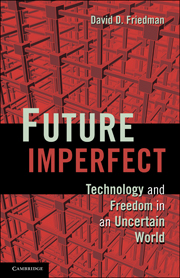1 - Introduction
Published online by Cambridge University Press: 18 August 2009
Summary
A few years ago I attended an event where the guest speaker was a Cabinet member. In conversation afterwards, the subject of long-term petroleum supplies came up. He warned that at some point, perhaps a century or so in the future, someone would put his key in his car's ignition, turn it, and nothing would happen – because there would be no gasoline.
What shocked me was not his ignorance of the economics of depletable resources – if we ever run out of gasoline it will be a long, slow process of steadily rising prices, not a sudden surprise – but the astonishing conservatism of his view of the future. It was as if a similar official, 100 years earlier, had warned that by the year 2000 the streets would be so clogged with horse manure as to be impassable. I do not know what the world will be like a century hence. But it is not likely to be a place where the process of getting from here to there begins by putting a key in an ignition, turning it, and starting an internal combustion engine burning gasoline.
This book grew out of a seminar on future technologies that I taught for a number of years at the law school of Santa Clara University. Each Thursday we discussed a technology that I was willing to argue, at least for a week, could revolutionize the world.
- Type
- Chapter
- Information
- Future ImperfectTechnology and Freedom in an Uncertain World, pp. 3 - 11Publisher: Cambridge University PressPrint publication year: 2008
- 2
- Cited by



